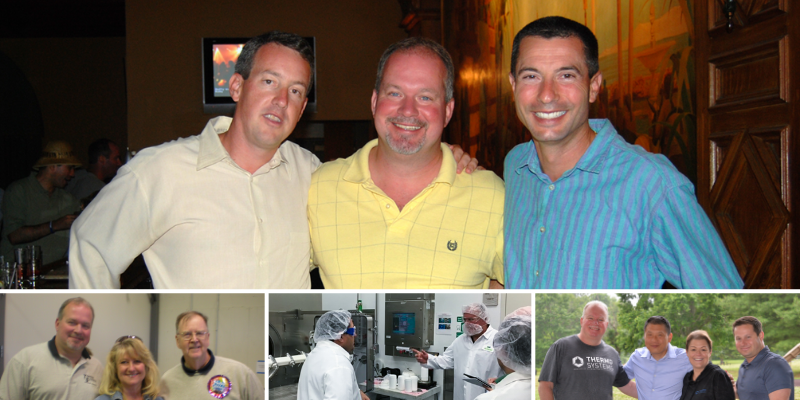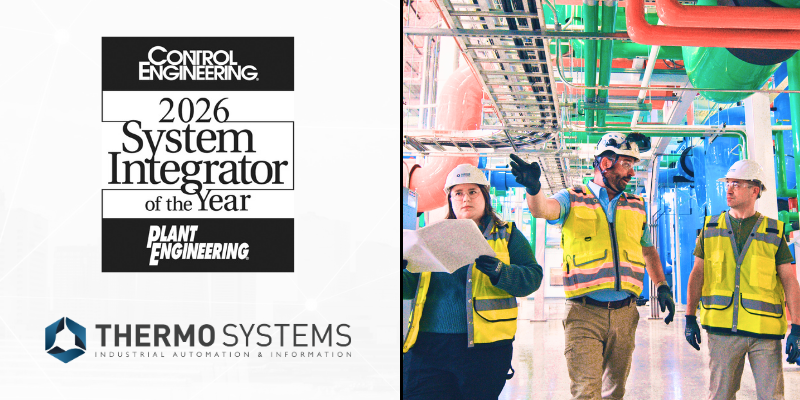
Celebrating 25 Years of Excellence: Mark Fisher’s Journey at Thermo Systems
Mark Fisher recently celebrated 25 years of service at Thermo Systems. Over the past 25 years, Mark has been a cornerstone of our company, helping to shape Thermo into the industry leader it is today.
Mark’s technical expertise is unmatched. As an ISA-Certified Automation Professional (ISA-CAP) and former ISA-Certified Cyber Security Specialist (ISA-CCSS — ISA99/IEC62443), he has consistently demonstrated a commitment to advancing both his own knowledge and the capabilities of our organization. His contributions extend beyond Thermo as well, including authoring several publications, such as a chapter in the International District Energy Association (IDEA) District Cooling Best Practices Guide.
Beyond his technical achievements, Mark has left an indelible mark through his role as a mentor. His guidance and support have helped countless team members grow and thrive, fostering a culture of continuous learning and collaboration across the company.
Mark’s Contribution to a Recent Project at Princeton University
One of Mark’s more recent contributions was his leadership on a massive infrastructure project that was implemented at Princeton University. The University has publicly committed to being a net-zero carbon producing institution by their 300th anniversary in 2046. To meet that commitment, the university has embarked on a once in a lifetime journey to convert its entire campus from steam to hot water heating. Miles of underground, old, and decrepit steam piping are being replaced with modern, well insulated hot water piping. All new buildings being built on campus are being designed for hot water heating and all existing buildings are being retrofitted for it.
Highly efficient heat pump chillers were installed in the campus’ existing thermal energy plant, as well as two new ones that were built specifically for this project, to generate the hot (and chilled) water energy needed to meet the university’s net-zero commitment.
Hot and chilled water thermal energy storage tanks were constructed at the two new plants that allow the university to generate and store thermal energy at night, when electricity costs are lower, and then pump it to its campus during the day. The thermal energy storage tanks act as daily thermal energy storage batteries that afford the university significant energy cost savings and operational flexibility
The university has also invested heavily in seasonal thermal energy storage in the form of geo-exchange. Hundreds of bores have been drilled into the ground in several geo-exchange fields built around the campus. The scale of the university’s investment in geo-exchange is unprecedented. The geo-exchange fields themselves were drilled under large structures and athletic fields that were being built around the same time as the new energy plants. Each bore is between 600 and 850 feet deep creating huge seasonal thermal energy storage batteries. In the summer, instead of exhausting all the heat removed from the campus into the atmosphere through cooling towers, that heat energy is pumped into the geo-exchange fields where it is absorbed into the surrounding bedrock. Then in the winter, that heat is extracted out of the bedrock and used to help heat the campus. Basically, the university is using heat that it stored all summer long to help heat its campus in the winter.
The combined use of highly efficient heap pump chillers, thermal energy storage, and geo-exchange is not only saving the university significant money in energy costs but is also a key component of their overall net-zero strategy.
Mark led a team of the industry’s most talented and experienced automation professionals who implemented the plant control systems in the two new plants and made the necessary changes in the existing one. The Thermo team worked closely with the general contractors, engineers, architects, and other trade organizations involved in the project to turn over a world-class installation to the university. In addition to being works of art in their own right, the new plants are highly efficient and flexible. There is quality everywhere you look thanks in large part to the technical acumen and skill of the entire Thermo team.
The Princeton University steam to hot water conversion project that the Thermo team expertly delivered for the university is one of the highlights of Mark’s long tenure at Thermo Systems and is one of the projects he is most proud of.
Congratulations, Mark, on 25 years of outstanding contributions! Your dedication and leadership continue to inspire us all.



